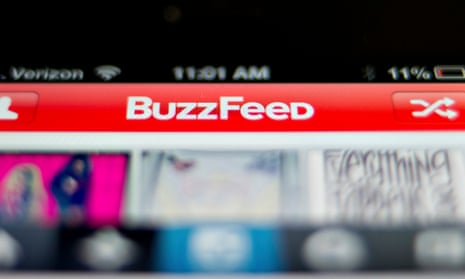BuzzFeed is to end its news operations in the UK and Australia, effectively marking the end of the digital upstart’s global ambition to shake up traditional news media.
Once derided for its focus on traffic-grabbing “listicles”, BuzzFeed transformed into a highly respected peer to traditional media outlets. On Wednesday it said it was giving up on local news and politics coverage in favour of news that “hits big” in the United States.
The company, which had been struggling before the coronavirus pandemic further hammered its lifeblood of advertising revenue, has furloughed its 10 UK news staff and four in Australia as part of the strategic cutback. BuzzFeed launched a local news operation in the UK just over six years ago.
According to sources, those furloughed are “highly unlikely” to return to BuzzFeed. BuzzFeed UK will keep staff covering news with a “global audience”, such as its investigations operation and celebrity news coverage, for now at least.
“For economic and strategic reasons, we are going to focus on news that hits big in the United States during this difficult period,” the company said.
“Therefore, we will notify staff in the UK and Australia that we are not planning to cover local news in those countries. We will be consulting with employees on our plans regarding furloughs and stand-downs in these regions.”
The company said that the cuts would also hit its flagship US operation as it looks to hit savings goals while continuing to produce “kinetic, powerful journalism”. “We [want to] reach the savings we need and produce the high-tempo, explosive journalism our readers rely on,” the company said.
BuzzFeed maintained that it was still “investing heavily” in its news operation, with a projection of investing $10m more this year than the division makes, and $6m in 2021.
Launched by Jonah Peretti in 2006, the outlet is among a generation of start-ups, also including Vice and Vox, that took the media world by storm only to run into financial difficulty as the advertising climate collapsed. As recently as 2016, the company had attracted a valuation of as much as $1.7bn.
The unprecedented advertising slump brought on by the coronavirus has hastened the end of an already struggling business model. In January, Peretti posted a 2,500-word blog laying out plans to diversify the ailing business’s revenue streams. Days later it was reported that he had upgraded his Los Angeles home, buying a $5.2m property.
He had previously publicly raised the prospect of merging with other digital publishers in order to gain the scale to fight on more equal terms with the likes of Facebook and Google, which dominate the digital advertising market.
Less than a year later, three of the companies Peretti referred to as potential partners had done deals: Vice, which has a more male-focused audience, acquired Refinery29, which targets millennial females, to create a $4bn publishing group. Vox bought New York Media, which owns sites including Vulture and The Cut, to build scale.
Meanwhile, it emerged in December that BuzzFeed’s international operations, non-US businesses including the UK, Germany, Australia and Brazil, had seen losses quadruple in 2018. International revenues fell by 35%, according to the most recently available public filings. In the same year BuzzFeed cut a third of its UK newsroom staff.
At the same time BuzzFeed News began asking readers to “help shape the future” of its content through donations, a similar model to that used by the Guardian. The support page, promoted at the bottom of news stories, asked for donations of $5 to $100 to diversify away from a reliance on advertising revenues. The move was described at the time as a way of keeping “BuzzFeed News free for everyone”.
BuzzFeed’s US-based parent company makes revenues of more than $300m but has been missing annual revenue targets by at least a fifth, and has yet to turn a global profit. The failure to hit revenue targets reportedly put paid to plans of a potential stock market flotation.


